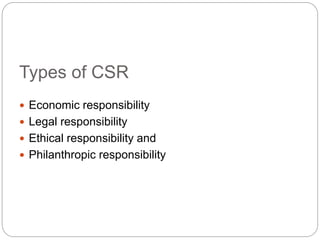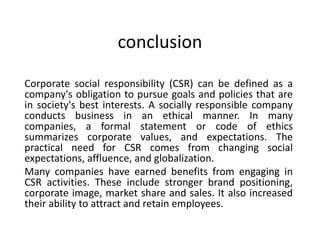Corporate social responsibility
- 1. By Nezamuddin MBA (IC) 4th year Roll no. 629 University School of Business Studies Punjabi University Patiala A seminar report on ŌĆśSocial responsibility of international business with respect to globalizationŌĆÖ
- 2. Introduction & definitions of corporate social responsibility
- 3. Benefits of CSR ’éŚ Improves financial performance ’éŚ Enhances brand image & reputation ’éŚ Increases sales and customers loyalty ’éŚ Increases attraction and retention of customers ’éŚ Reduces regulatory oversight
- 4. Types of CSR ’éŚ Economic responsibility ’éŚ Legal responsibility ’éŚ Ethical responsibility and ’éŚ Philanthropic responsibility
- 6. Factors affecting globalization theory ’éŚ Competition ’éŚ Exchange of technology ’éŚ Information transfer ’éŚ Portfolio investment ’éŚ Regulation/deregulation and international standards ’éŚ Market integration
- 7. Is globalization an opportunity or threat for CSR
- 8. Key drivers of CSR ’éŚ Ethical consumerism ’éŚ Transparency and trust ’éŚ Increased public expectations of business ’éŚ Employee motivation ’éŚ Laws and regulations ’éŚ Supplier relations ’éŚ Competitive labour market
- 9. Positive outcomes of CSR ’éŚ To the company ’éŚ To the community and the general public ’éŚ To the environment
- 10. Benefits to the company ’éŚ Improves financial performance ’éŚ Lower operating costs ’éŚ Enhances brand image and reputations ’éŚ Greater productivity ’éŚ Greater quality ’éŚ More attraction and retention of employees and customers
- 11. Benefits to the community and the general public ’éŚ Charitable contributions ’éŚ Employee volunteer programmes ’éŚ Product safety and quality ’éŚ Corporate involvement in community education, employment and homelessness programmes
- 12. Environmental benefits ’éŚ Greater material recyclability ’éŚ Better product durability and functionality ’éŚ Greater use of renewable resources
- 13. Globalization and its effects on international business
- 14. conclusion Corporate social responsibility (CSR) can be defined as a company's obligation to pursue goals and policies that are in society's best interests. A socially responsible company conducts business in an ethical manner. In many companies, a formal statement or code of ethics summarizes corporate values, and expectations. The practical need for CSR comes from changing social expectations, affluence, and globalization. Many companies have earned benefits from engaging in CSR activities. These include stronger brand positioning, corporate image, market share and sales. It also increased their ability to attract and retain employees.
- 15. THANK YOU














